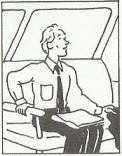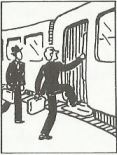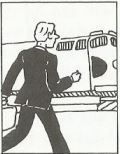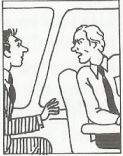
Everyday the same
 المؤلف:
L.A Hill
المؤلف:
L.A Hill
 المصدر:
Advanced-Anecdotes in American English
المصدر:
Advanced-Anecdotes in American English
 الجزء والصفحة:
8-1
الجزء والصفحة:
8-1
 12/10/2022
12/10/2022
 1131
1131

Mr. Smith lived in the country, but he worked in an office in the big city, so five days a week he went to work by train every morning and came home the same way.
One morning he was reading his newspaper on the train when a man sitting behind him, who Mr. Smith had never met before, leaned forward, tapped him on the shoulder and spoke to him. The man said, "You're not leading a very interesting life, are you? You get on the same train at the same station at the same time every morning, and you always sit in the same seat and read the same newspaper."
Mr. Smith put his paper down, turned around, and said to the man angrily, "How do you know all that about me?"
"Because I'm always sitting in this seat behind you," the man answered.
A Answer these questions:
- How did Mr. Smith go to and from his office every day?
- What happened to him on the train one morning?
- What was he doing when this happened?
- What did the man say to Mr. Smith?
- What did Mr. Smith ask the man?
- Why did the man know so much about him?
B Which of these sentences are true? Write down the correct ones.
- Mr. Smith did not go to his office on weekends.
- Mr. Smith went to his office by train five days a week.
- While he was reading his newspaper one day, he leaned forward and tapped a man on the shoulder.
- While he was reading his newspaper one day, he was tapped on the shoulder by another man.
- The man sitting behind him had never seen Mr. Smith before.
- The man sitting behind Mr. Smith always saw him in the same seat.
- The man thought Mr. Smith's life was dull.
- The man thought Mr. Smith's life was very interesting.
- The man's own life was much more interesting than Mr. Smith's.
- The man's own life was just as uninteresting as Mr. Smith's.
C Write the number of the correct sentence under each picture:

1-He always sat in the same seat every day.

2-He got on the train.

3-He hurried to the train station.

4-He read his newspaper thoroughly.

5-He turned around and spoke angrily to the man who had interrupted his reading.

6-Mr. Smith put his newspaper down.

7-Mr. Smith left his house at 7:00 A.M. every morning.

8-One day another passenger tapped him on the shoulder.
 الاكثر قراءة في Advanced
الاكثر قراءة في Advanced
 اخر الاخبار
اخر الاخبار
اخبار العتبة العباسية المقدسة


